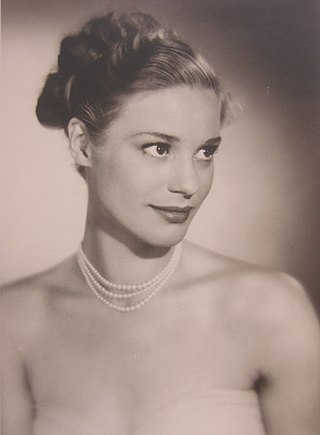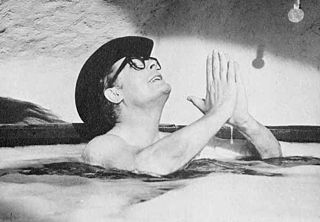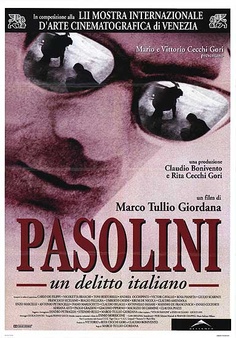Adriana Asti | |
|---|---|
 | |
| Born | 30 April 1931 Milan, Kingdom of Italy |
| Occupation | Actress |
| Years active | 1952–present |
| Spouse | Bernardo Bertolucci (divorced) |
Adriana Asti (born 30 April 1931) [1] is an Italian stage, film, and voice actress. [2]
Adriana Asti | |
|---|---|
 | |
| Born | 30 April 1931 Milan, Kingdom of Italy |
| Occupation | Actress |
| Years active | 1952–present |
| Spouse | Bernardo Bertolucci (divorced) |
Adriana Asti (born 30 April 1931) [1] is an Italian stage, film, and voice actress. [2]
Adriana Asti appeared very young in Dino Risi's short film Buio in sala, shot in 1948. She made her theatrical debut in 1951 acting in Plautus' Miles Gloriosus (play) with the stable company of Bolzano,and achieved her first personal success with a part in Arthur Miller's The Crucible, directed by Luchino Visconti, who would later offer her some roles in the films Rocco and His Brothers (as the girl in the laundry) and Ludwig (where she plays Lila Von Buliowski).
This section of a biography of a living person does not include any references or sources .(October 2023) |
On stage, she starred in Saint Joan by George Bernard Shaw, Happy Days by Samuel Beckett, The Mistress of the Inn by Carlo Goldoni, and Three Men for Amalia. She won the SIAE prize in 1990, and the Duse prize in 1993. In 1999, she wrote and starred in Alcohol. In 2000, she starred in French Ferdinand.
She was married to Bernardo Bertolucci.

| Award | Year | Nominated work | Category | Result |
|---|---|---|---|---|
| David di Donatello Awards | 1974 | David Special Award | Won | |
| Nastro d'Argento Awards | 1965 | Before the Revolution | Best Actress | Nominated |
| 1974 | A Brief Vacation | Best Supporting Actress | Won | |
| 1977 | The Inheritance | Best Supporting Actress | Won | |
| 2004 | The Best of Youth | Best Actress | Won | |
| Tosca e altre due | Nominated | |||
| 2015 | Special Nastro d'Argento | Won | ||
| 2018 | A Woman's Name | Best Supporting Actress | Nominated | |

Luchino Visconti di Modrone, Count of Lonate Pozzolo was an Italian filmmaker, theatre and opera director, and screenwriter. He was one of the fathers of cinematic neorealism, but later moved towards luxurious, sweeping epics dealing with themes of beauty, decadence, death, and European history, especially the decay of the nobility and the bourgeoisie. Critic Jonathan Jones wrote that “no one did as much to shape Italian cinema as Luchino Visconti.”

Bernardo Bertolucci was an Italian film director and screenwriter with a career that spanned 50 years. Considered one of the greatest directors in Italian cinema, Bertolucci's work achieved international acclaim. With The Last Emperor (1987) he became the first Italian filmmaker to win the Academy Award for Best Director, and he received many other accolades including a BAFTA Award, a César Award, two Golden Globes, a Golden Lion in 2007, and an Honorary Palme d'Or at Cannes in 2011.

Silvana Mangano was an Italian film actress. She was one of a generation of thespians who arose from the neorealist movement, and went on to become a major female star, regarded as a sex symbol for the 1950s and '60s. She won the David di Donatello for Best Actress three times – for The Verona Trial (1963), The Witches (1967), and The Scientific Cardplayer (1972) – and the Nastro d'Argento for Best Actress twice.

Ingrid Lilian Thulin was a Swedish actress and director who collaborated with filmmaker Ingmar Bergman. She was often cast as harrowing and desperate characters, and earned acclaim from both Swedish and international critics. She won the Cannes Film Festival Award for Best Actress for her performance in Brink of Life (1958) and the inaugural Guldbagge Award for Best Actress in a Leading Role for The Silence (1963), and was nominated for a Best Supporting Actress BAFTA for Cries and Whispers (1972).

Laura Betti was an Italian actress known particularly for her work with directors Federico Fellini, Pier Paolo Pasolini and Bernardo Bertolucci. She had a long friendship with Pasolini and made a documentary about him in 2001.

Helmut Berger was an Austrian actor, known for his portrayal of narcissistic and sexually ambiguous characters. He was one of the stars of European cinema in the late 1960s and 1970s, and is regarded as a sex symbol and pop icon of that period.

Tomas Milian was a Cuban-born actor with American and Italian citizenship, known for the emotional intensity and humor he brought to starring roles in European genre films.

Pierre André Clémenti was a French actor.

Massimo Girotti was an Italian film actor whose career spanned seven decades.
The Nastro d'Argento for Best Director is a film award bestowed annually as part of the Nastro d'Argento awards since 1946, organized by the Italian National Association of Film Journalists, the national association of Italian film critics.

Once You're Born You Can No Longer Hide is a 2005 Italian drama film directed by Marco Tullio Giordana. The film concerns undocumented migration to Italy via the Mediterranean Sea.

Maria Michi was an Italian supporting actress who worked with Roberto Rossellini on his two early neorealism masterpieces: Rome, Open City and Paisà.
Fiorella Infascelli is an Italian film director and screenwriter.

The list of the A hundred Italian films to be saved was created with the aim to report "100 films that have changed the collective memory of the country between 1942 and 1978". Film preservation, or film restoration, describes a series of ongoing efforts among film historians, archivists, museums, cinematheques, and nonprofit organization to rescue decaying film stock and preserve the images they contain. In the widest sense, preservation assures that a movie will continue to exist in as close to its original form as possible.
Franco "Kim" Arcalli was an Italian film editor and screenwriter best known for his work with Bernardo Bertolucci, Tinto Brass and Michelangelo Antonioni.
The Nastro d'Argento is a film award assigned each year, since 1948, by Sindacato Nazionale dei Giornalisti Cinematografici Italiani, the association of Italian film critics.

Pasolini, un delitto italiano, internationally released as Who Killed Pasolini?, is a 1995 Italian crime-drama film co-written and directed by Marco Tullio Giordana. It was released on 3 July 1996. It depicts the trial against Pino Pelosi, who was charged with the murder of artist and filmmaker Pier Paolo Pasolini.
Enrico Medioli was an Italian screenwriter.

A Woman's Name is a 2018 Italian drama film co-written and directed by Marco Tullio Giordana and starring Cristiana Capotondi. For her performance in the film, Adriana Asti received a Nastro d'argento nomination for best supporting actress. The film also received two Globo d'oro nominations, for best actress (Capotondi) and best score.